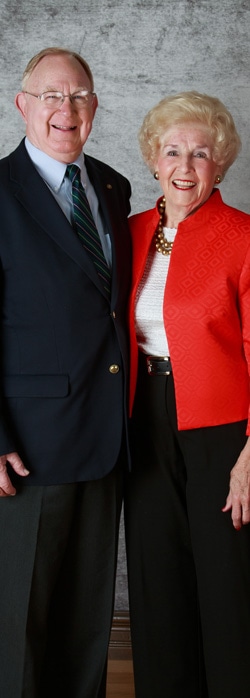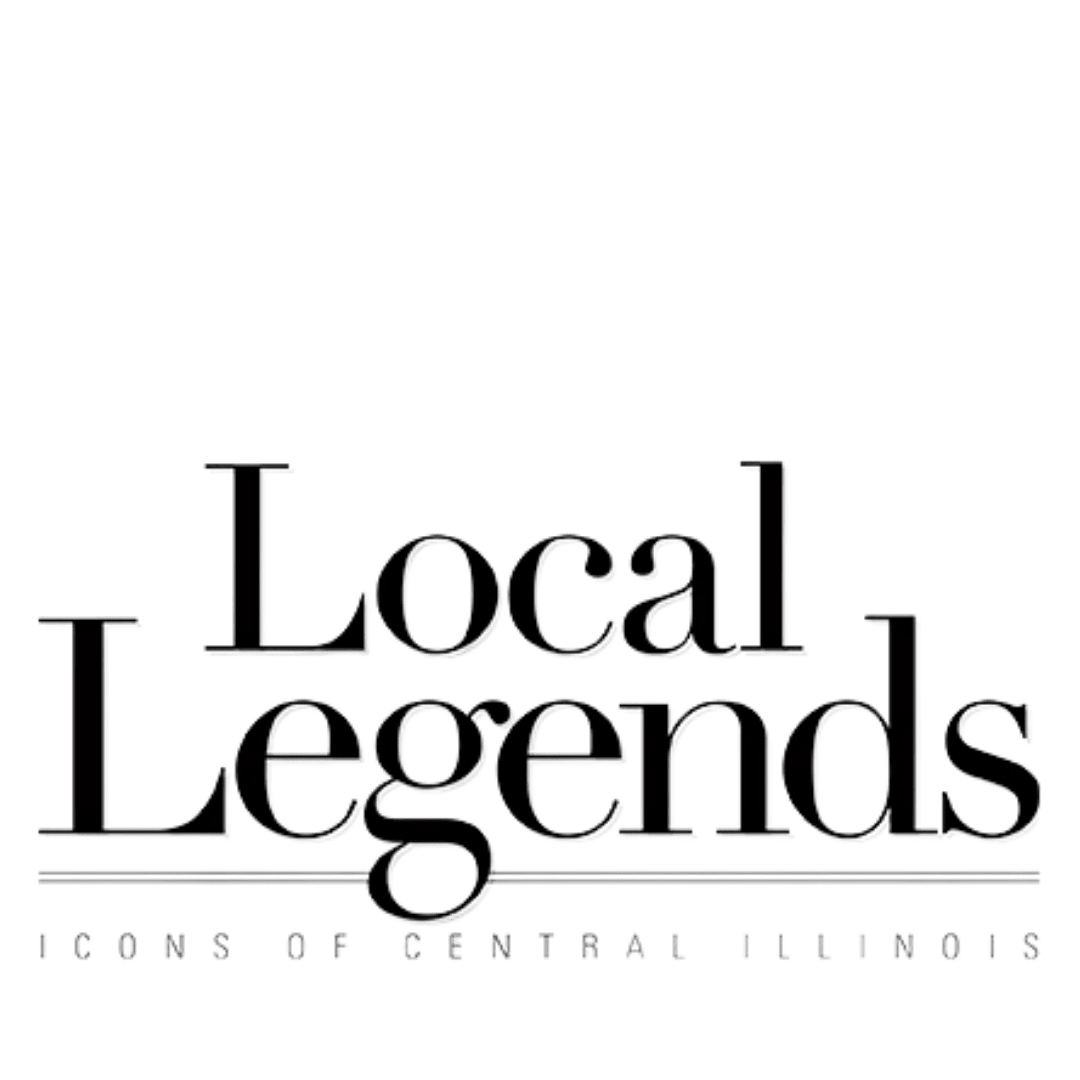There’s an old Chinese saying that states, “Good things come in pairs.” In central Illinois, one need not look further than our own community for confirmation of the age-old adage. Throughout their 160 collective years, Art and Judy Oakford have touched the lives of thousands through their combined philanthropic efforts and shared passion for volunteerism.
Between running a business, raising a family and tackling a mid-life career change, the couple has managed to devote the better part of their lives to helping others through a plethora of health, education, service and nonprofit organizations—from the Heart of Illinois United Way, Peoria Friendship House and Peoria Riverfront Museum to the Junior League, Neighborhood House and OSF Saint Francis Medical Center. And at ages 82 and 78, respectively, neither Art nor Judy shows sign of slowing down anytime soon. Taking on each day with lots of laughter and plenty of love, the Oakfords enjoy their busy lives full of family, good friends and good deeds.
Tell us about your upbringing. How did it influence your values?
Art: My family’s been from Peoria for several generations. I was born here in the old Proctor Hospital that’s now been burned down. It was on Second Street, long before you were around.
Judy: Before most were! (chuckles)
Art: [I was] brought up in the public schools. The last three years of grade school I was out in Peoria Heights, and then I went to Peoria Central, two years at the University of Wisconsin, two years at Bradley and finished there.
Judy: I came to Peoria when I was seven, so I consider myself a native, and went to Whittier and Peoria High School and then DePauw University in Greencastle. [I] was going to be in teaching, but I ended up getting married.
Art: She’s been trying to teach me ever since! (laughs)
Judy: Anyway, we’re really from Peoria, and I think that our parents, each of ours, we didn’t really ever think about it, but they definitely were a part of the community, as far as in different projects.
Art: It goes clear back to my grandfather [Aaron S. Oakford]. He was very involved in the community.
Judy: His grandfather [helped start] Neighborhood House.
Art: He was a very good friend of John Proctor, and Proctor started Proctor Hospital and the Proctor Home and some of those things. My grandfather, because of that close relationship, was on the board of those things initially. So we kind of come by it from our parents and grandparents. My dad was very involved in scouting and was a member of the Peoria Heights School Board. My mother was involved with girl scouting and was a member of the Peoria Heights Library Board. So we just grew up with it… [Judy’s] dad was on the Peoria Library Board and on the Saint Francis Hospital [board].
Judy: My mother was in a lot of things—the Service League, Methodist and that type of thing. I think that we were just lucky to have that exposure, and it was a natural interest… Some people will go back to school and take classes. I think this is the way I’ve learned—from people—and it’s been wonderful and just an education in itself, and yet you’re a part of it too.
Tell us about how you met and fell in love. How did married life influence your volunteerism?
Judy: We had known each other a little bit and known each other’s family a little bit. And he was three years older, which was a lot at that time.
Art: I still am…
Judy: Yeah! Which I remind him daily! (laughs)… Anyway, he came over to DePauw my whole sophomore year and even took confirmation classes there, because we were joining a different church. So we just sort of started from then on. And two years in the service and back here, we were very lucky. Had four children and we were all healthy, and we were really very, very lucky. [We] got involved in things and… just kind of made that a part of our world, along with neat friends and that type of thing.
Art: [Back then, Judy] had more time, and I was in the retail grocery business. The hours were pretty long and not very dependable sometimes, so I didn’t have as much free time as Judy did. But I think I started getting more involved when our girls were getting older and we decided that we needed to know more about what their world was all about and the kinds of things they would be facing.

You’ve both dedicated your time to a multitude of causes. Which of your accomplishments are you most proud of?
Judy: One thing… [is] Kids Konnected, which is the support group for the kids whose parents have or had cancer. Initially, I started that with Diane Cullinan Oberhelman… and did it for 13 years. It really continues to be an important message… The need is still there because the kids, they really don’t feel they have anyone to talk to. And yet they do—but they don’t know it. And they don’t know anyone else having the same problems—having a parent with cancer—and there are lots of them.
Art: My favorite experiences, I think, were with two organizations. One was the Human Service Center, because Jack Gilligan was the director at that time and he taught me more about how not-for-profit boards and organizations should operate, and I think that was a really important learning experience for me to apply to some other organizations later on… We formed a holding company—the Fayette Companies—and it was kind of a different concept for not-for-profits… but it was a pretty good arrangement… While we were there, we opened White Oaks, the drug [addiction] center for men out on Willows Knolls Road… There was a need in the area for a place for people when they had reached the bottom and they could go and get dried out, go through a program and totally detox in the right conditions… They were safe and the temptations weren’t there. And if they tried to fall apart, the staff could catch them before they did.
What’s everyday life like in the Oakford household?
Art: Well [Judy] gets up and goes to work.
Judy: Yes.
Art: And I get up every morning. (chuckles)
Judy: We each exercise every day, and in the summer we play some golf and we have a good time.
Even in “retirement,” you both still maintain fairly busy schedules [Judy works part-time at the Red Cross, Art serves as an ambassador for the United Way, and both regularly attend various board and club meetings.] How do you relax and unwind?
Art: If I have time, I go out on my bicycle.
Judy: He still rides about 25 miles, three times a week.
Art: I rode over 2,000 miles last year. Now that’s not much for somebody your age, but for old folks that’s a lot! (laughs)
Judy: We read a lot, both of us… And I exercise, I’m in a bridge club and several ladies groups, and just friends. Family and friends are the key to the whole thing.
Art: I heard somebody speak about retirement many, many years ago, and the one thing I remember from this whole talk was that ‘It’s important to retire to something, not from something.’ That just stuck with me. You’ve got to stay busy and just keep going.
What do you consider to be your guiding life philosophy?
Art: Well, I think there were probably three things that have been the biggest influence on my life and the way I’ve attempted to live it. One were my parents, who got along, had a great love affair with one another, and gave to the community and gave us good values as children. Second, I was a Boy Scout and I took seriously the Scout Law. And I can still remember the 12 points of the Scout Law, and they kind of represent all of the good traits everybody should have. So I think that made a big impression, and I stayed in it until I got my 21 merit badges and became an Eagle Scout.
And the third thing, I think I was probably six or seven, eight years old and went to the YMCA day camp… and the counselor… gave us what today would look like a bumper sticker, a white background with bright red lettering on it, and it said, ‘I’m third.’ It didn’t mean anything to us and then he said, ‘Let me tell you what this is. I want you to take this home and put it on your mirror, on the head of your bed or someplace you’ll see it everyday. And I want you to look at it, because it means God is first, the other guy is second and I’m third.’
Judy: You just accept and have faith and learn to dance in the rain.
 Looking back, what is the most difficult obstacle you’ve overcome?
Looking back, what is the most difficult obstacle you’ve overcome?
Art: Probably one of the most difficult was to close the retail grocery business. That was probably the biggest and toughest thing I really had to do because my dad was working for me at that time.
Judy: At the age of 86.
Art: I’d worked for him and the family had been in the grocery business for, at that time, about 113,115 years. And that meant the family wasn’t going to be in the grocery business anymore. But it was too hard to make a profit. We were the newest and biggest business in town when we started, and the smallest and oldest when we closed.
Judy: It was just life.
Art: Just the typical life cycle of a small business. Then I had to decide what I was going to do. I wasn’t going to be sitting around, and I couldn’t afford to just do nothing, so I had to get together a resume, which I’d never done before… That meant a whole deal of change.
Judy: And you were 54.
Art: Ehh… 53 I think.
Judy: Well, alright…
Art: Yeah. Kind of an awkward time to start out in the job market. But I was fortunate, and we closed in June of ’82 and I think by the middle of September I went to work for First National Bank [now Commerce Bank].
What is the most surprising thing you’ve learned through your life experiences?
Art: I think probably overall, you realize that the more you give, the better you feel… I have a feeling that people who have not done things for or with other people with any regularity… don’t realize how good you can feel when you do something that’s going to have an impact on the lives of other people.
Judy: Added to that is the courage and the resiliency of people. They’re remarkable on things that they’ve had to deal with that we have not had to. They do care and they are really a viable part of our community.
What legacy would you like to be remembered for?
Judy: That we cared about the community and the people.
Art: Hmm… I don’t know. I haven’t thought about it. You sort of hope that you won’t be totally forgotten too soon… (laughs)
Judy: [To answer by quote,] ‘Live so that when your children and grandchildren think of fairness, caring and integrity, they will think of you.’
How does it make you feel to know you’ve had a hand in helping so many people over the years?
Art: I don’t know if you really even think about that. It’s nice to know that you’re giving back to community, and I think we probably felt we had more time than money, and that’s why we did more of these kinds of things… We got involved and gave our time and shared what experiences and knowledge… we might have had to help other people.
Judy: I think it is a form of tithing… just giving back and just being a part of [something], probably even more than giving back.
Art: You meet some really terrific people…
Judy: Oh, gosh. Yeah.
Art: …in these various agencies and programs that are just so passionate about what they’re doing… It’s neat to be associated with that kind of passion and the kind of people doing those things.
What advice would you give to a young person looking to make a difference in his or her community or the world?
Art: Get involved.
Judy: Do it.
Art: I just [recently saw] a great quote: ‘Don’t let perfect get in the way of good. Start now. Get involved…’ So many people, I’m sure, think, ‘Well if I can’t do this just perfectly, I better not start it and mess it up.’ Don’t worry about that. Start! Get involved! Do something! … If you do, you’ll find that you get as much joy out of it as the people who you are helping. iBi






